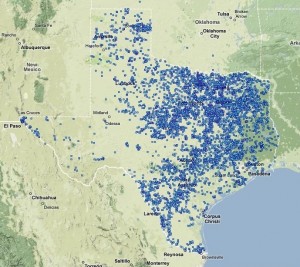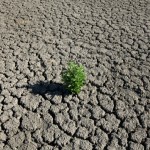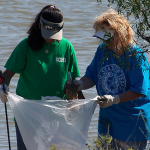Want to Learn About a Nearby Dam? In Texas, Some Questions Are Off Limits

Texas has more dams than any other state in the country. This is a map of Texas dams from the USACE.
This is part three of a series looking at the infrastructure of dams in Texas, and what can be done to improve it. You can find part one here, and part two here.
In 1978 a massive storm hit the West Texas town of Albany. It dumped 23 inches of rain in just eight hours. Waters caused 9 deaths, flooded hundreds of homes, and broke through a local dam. Troy Henderson, who now works on the Brownwood Texas Lake Patrol, says since then he’s followed a simple rule.
“If I were to build a home somewhere, I’d make sure that if it was downstream from a lake that their dam is property maintained,” he told StateImpact Texas, “and the reason I say that is, I lived in Albany in 1978.”
The Federal Government echoes that advice. In the FEMA booklet “Living with Dams,” the agency urges people to “ask questions” about the condition and hazard rating of dams near their homes.
But here in Texas, no one needs to answer those questions.
“There are certain things that we are not allowed to share like the hazard classification of a dam or something that’s more related to homeland security,” Warren Samuelson, Manager of the Texas Dam Safety Program, explained to StateImpact Texas.
The reason is a 2005 opinion by the Texas Attorney General that keeps information about dams secret – citing concerns for homeland security. The results of that secrecy in Texas can be confusing.
Take the dam safety workshops presented by the TCEQ. They’re are filled with images and examples of Texas dams in surprisingly bad condition. But if you ask exactly where those structures are located, the agency refers you to the state Attorney Generals ruling.At a presentation in August, the FEMA recommendations came up specifically. Dam owners were told that they did not have to provide information to their neighbors about their dams. At that workshop the TCEQ’s Warren Samuelson also said the Commission can’t give information to floodplain administrators. A fact that frustrates some public safety officials.
“I think that there is some things that public should be aware of, such as if they’re going to be the area that may be inundated with water from a flood,” Bill Smith, an emergency management director and floodplain administrator in Jasper County, East Texas, told StateImpact Texas.
While the TCEQ does give Emergency Action Plans to local emergency management coordinators, it only supplies other confidential information in a time of disaster if the need is deemed “legitimate.” Like some others in public safety, Smith questions the benefit of keeping such important information secret.
“The dams in my area are in good shape as far as the larger dams,” he said. “Now, the smaller dams, the private dams, I’m not that sure about because I don’t have the information.”
Policies vary state-to-state and different federal agencies have still different policies. While the TCEQ guards some dam details, some local entities in Texas will happily share facts about dams under their control. The lack of a system of rules has not escaped the notice of policymakers, says Civil Engineer John Wolfhope. He sits on the National Dam Safety Review Board, a group that advises FEMA on Federal guidelines for dam safety.
“It’s a discussion going on at a national level to provide guidance on how this information should be treated.” Wolfhope told StateImpact Texas, “Unfortunately we’re still in a state of limbo as of this year.”
But he’s confident new recommendations will emerge soon. Once they are released, it will be up to the state of Texas to decide whether to follow them.


